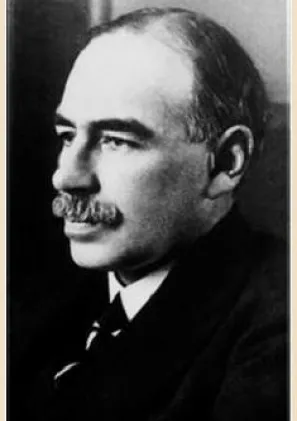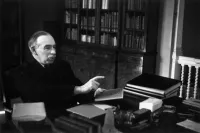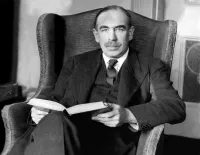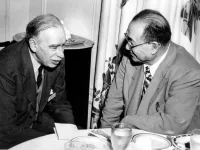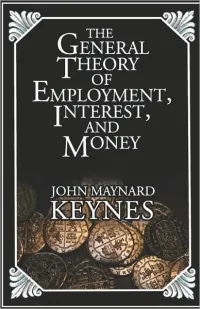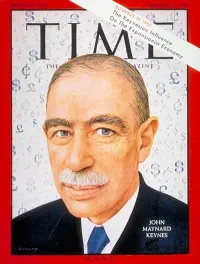Biography
1883 - 1946
"Capitalism is the astounding belief that the most wickedest of men will do the most wickedest of things for the greatest good of everyone."
- John Maynard Keynes
He entered King’s College, Cambridge, in 1902 and soon gave up studying mathematics to pursue a career in economics and politics. While there he was also drawn to the Apostles, an elite group of free spirits, artists and writers, mostly gay and bisexual, that produced several influential relationships for him which endured for decades. Keynes taught economics at Cambridge until he was called into service by the Treasury office to accompany Lloyd George to the Versailles Peace Conference, where he was appalled by what he saw as draconian measures of reparations that were to be imposed on Germany in the aftermath of World War I. He resigned his position in protest and wrote The Economic Consequences of the Peace (1919), perhaps the most influential polemic on Western politics of the era. His permanent influence on 20th century economic thought was assured with the publication of The General Theory of Employment, Interest and Money (1935-1936) – a monumental work that asserted the Great Depression could not be blamed on the unemployed but on the activities of business investors and governments. He endorsed private investment, easy credit, and low interest rates and recommended that governments run deficits in a slow economy – all policies which influenced most western democracies in the second half of the 20th century. During World War II he assumed the most significant role in the history of international economics by over-seeing the creation of the World Bank and the International Monetary Fund, which remain the preeminent financial institutions in the world today.
1883 - 1946
"Capitalism is the astounding belief that the most wickedest of men will do the most wickedest of things for the greatest good of everyone."
- John Maynard Keynes
He entered King’s College, Cambridge, in 1902 and soon gave up studying mathematics to pursue a career in economics and politics. While there he was also drawn to the Apostles, an elite group of free spirits, artists and writers, mostly gay and bisexual, that produced several influential relationships for him which endured for decades. Keynes taught economics at Cambridge until he was called into service by the Treasury office to accompany Lloyd George to the Versailles Peace Conference, where he was appalled by what he saw as draconian measures of reparations that were to be imposed on Germany in the aftermath of World War I. He resigned his position in protest and wrote The Economic Consequences of the Peace (1919), perhaps the most influential polemic on Western politics of the era. His permanent influence on 20th century economic thought was assured with the publication of The General Theory of Employment, Interest and Money (1935-1936) – a monumental work that asserted the Great Depression could not be blamed on the unemployed but on the activities of business investors and governments. He endorsed private investment, easy credit, and low interest rates and recommended that governments run deficits in a slow economy – all policies which influenced most western democracies in the second half of the 20th century. During World War II he assumed the most significant role in the history of international economics by over-seeing the creation of the World Bank and the International Monetary Fund, which remain the preeminent financial institutions in the world today.
Demography
Demography
Gender Male
Sexual Orientation Bisexual
Gender Identity Cisgender
Ethnicity Caucasian/White
Faith Construct Atheist
Nations Affiliated United Kingdom
Era/Epoch Interwar Period (1918-1939) World War I (1914-1918) World War II (1939-1945)
Field(s) of Contribution
Academics
Author
Business
Diplomacy
Editor
Journalism
Lecturer
Mathematics
Politics
Commemorations & Honors
Appointed Companion of the Order of the Bath For His Wartime Work (1917)
Appointed Versailles Peace Conference Treasury Financial Representative (1919)
Given Hereditary Peerage Baron Keynes of Tilton, in the County of Sussex in the King's Birthday Honors (1942)
Member of the House of Lords, First Baron Keynes (1942)
Time Magazine Named Him One of the Most Important People of the 20th Century (1999)
Demography
Gender Male
Sexual Orientation Bisexual
Gender Identity Cisgender
Ethnicity Caucasian/White
Faith Construct Atheist
Nations Affiliated United Kingdom
Era/Epoch Interwar Period (1918-1939) World War I (1914-1918) World War II (1939-1945)
Field(s) of Contribution
Academics
Author
Business
Diplomacy
Editor
Journalism
Lecturer
Mathematics
Politics
Commemorations & Honors
Appointed Companion of the Order of the Bath For His Wartime Work (1917)
Appointed Versailles Peace Conference Treasury Financial Representative (1919)
Given Hereditary Peerage Baron Keynes of Tilton, in the County of Sussex in the King's Birthday Honors (1942)
Member of the House of Lords, First Baron Keynes (1942)
Time Magazine Named Him One of the Most Important People of the 20th Century (1999)
Resources
Resources
Davenport-Hines, Richard. Universal Man: The Lives of John Maynard Keynes. New York: Basic Books, 2015.
Escoffier, Jeffrey. John Maynard Keynes. Lives of Notable Gay Men and Lesbians. New York: Chelsea House, 1995.
Hession, Charles H. John Maynard Keynes: A Personal Biography of the Man Who Revolutionized Capitalism and the Way We Live. New York: Macmillan, 1984.
http://en.wikipedia.org/wiki/John_Maynard_Keynes
https://www.britannica.com/biography/John-Maynard-Keynes
http://www.theguardian.com/books/2013/may/04/niall-ferguson-apologises-gay-keynes
https://www.businessinsider.com/john-maynard-keynes-niall-ferguson-gay-…
https://www.nytimes.com/2020/05/20/books/review-price-of-peace-john-may…
Resources
Davenport-Hines, Richard. Universal Man: The Lives of John Maynard Keynes. New York: Basic Books, 2015.
Escoffier, Jeffrey. John Maynard Keynes. Lives of Notable Gay Men and Lesbians. New York: Chelsea House, 1995.
Hession, Charles H. John Maynard Keynes: A Personal Biography of the Man Who Revolutionized Capitalism and the Way We Live. New York: Macmillan, 1984.
http://en.wikipedia.org/wiki/John_Maynard_Keynes
https://www.britannica.com/biography/John-Maynard-Keynes
http://www.theguardian.com/books/2013/may/04/niall-ferguson-apologises-gay-keynes
https://www.businessinsider.com/john-maynard-keynes-niall-ferguson-gay-…
https://www.nytimes.com/2020/05/20/books/review-price-of-peace-john-may…
